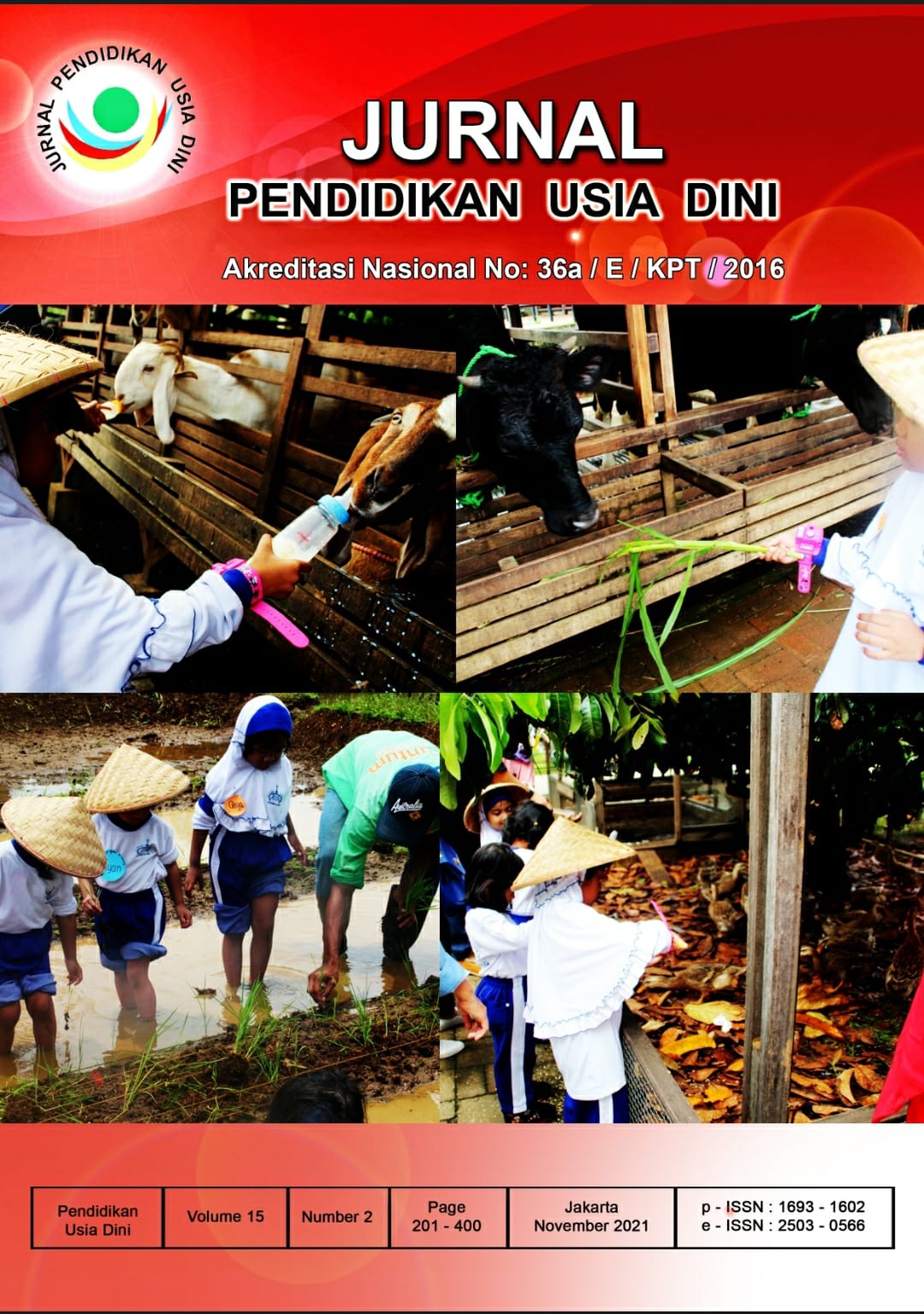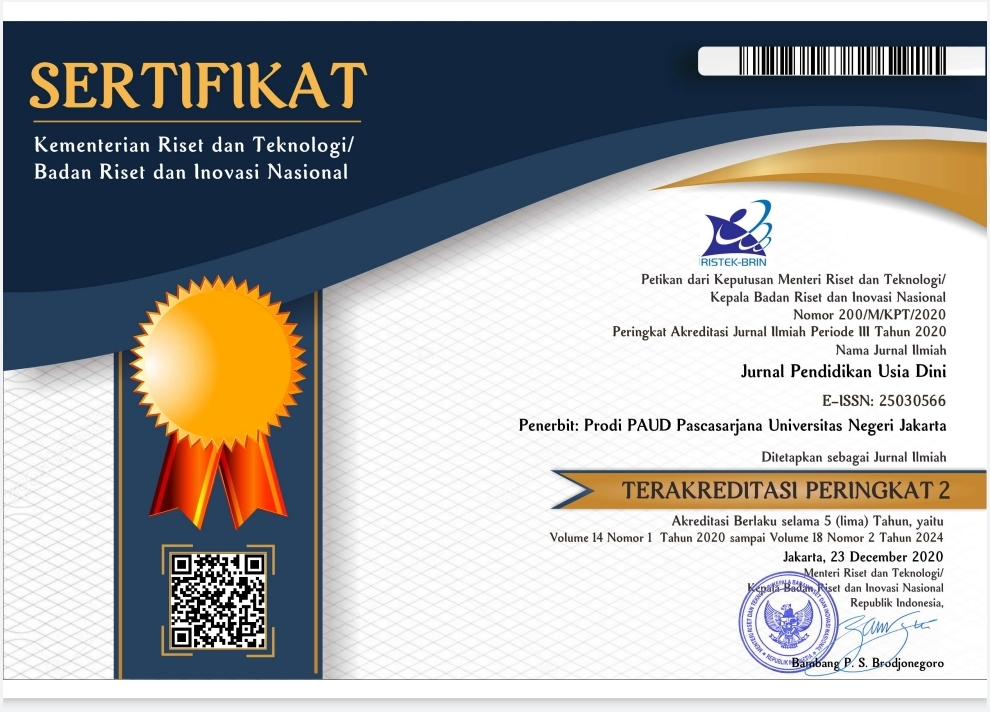Parents’ Perspective on The Online Learning Using Zoom Application in Early Childhood Education
DOI:
https://doi.org/10.21009/JPUD.152.06Abstract
ABSTRACT: During the pandemic, as the entire education system of the world shifts to distance learning, parents become important agents of learning, assisting children in understanding how to continue learning, using digital screens, and supporting them in this process. The main purpose of this study was to obtain information from parents in the use of the ZOOM application starting from the preparation and implementation of learning. Using a qualitative descriptive method, this study identified the parental perspectives of 20 participants. The summary of the results shows, (1) parents have difficulty because they are not familiar with the ZOOM application. (2) The learning process is often constrained by equipment related to the ZOOM application. (3) It requires the use of an Internet quota package with a very good network. (4) The process requires a quiet place so as not to interfere with the learning process. (5) Parents need extra patience in directing children during the ongoing learning process. (6) The learning process lasts about two hours, and parents must postpone their homework/work to help their children complete their online activities.
Keywords: parents perspective, online learning, early childhood education
References:
Abuhammad, S. (2020). Barriers to distance learning during the COVID-19 outbreak: A qualitative review from parents’ perspective. Heliyon, 6(11), e05482. https://doi.org/10.1016/j.heliyon.2020.e05482
Aldhafeeri, F. M., & Khan, B. H. (2016). Teachers’ and Students’ Views on E-Learning Readiness in Kuwait’s Secondary Public Schools. Journal of Educational Technology Systems, 45(2), 202–235. https://doi.org/10.1177/0047239516646747
Alfadda, H. A., & Mahdi, H. S. (2021). Measuring Students’ Use of Zoom Application in Language Course Based on the Technology Acceptance Model (TAM). Journal of Psycholinguistic Research, 50(4), 883–900. https://doi.org/10.1007/s10936-020-09752-1
Alharbi, S., & Drew, S. (2014). Using the Technology Acceptance Model in Understanding Academics’ Behavioural Intention to Use Learning Management Systems. International Journal of Advanced Computer Science and Applications, 5(1). https://doi.org/10.14569/IJACSA.2014.050120
Apuke, O. D., & Iyendo, T. O. (2018). University students’ usage of the internet resources for research and learning: Forms of access and perceptions of utility. Heliyon, 4(12), e01052. https://doi.org/10.1016/j.heliyon.2018.e01052
Briggs, D. C. (2020). COVID-19: The Effect of Lockdown on Children’s Remote Learning Experience – Parents’ Perspective. Journal of Education, Society and Behavioural Science, 42–52. https://doi.org/10.9734/jesbs/2020/v33i930257
Carlson, J. F. (2020). Context and regulation of homeschooling: Issues, evidence, and assessment practices. School Psychology, 35(1), 10–19. https://doi.org/10.1037/spq0000335
Creswell, J. W. (2015). Educational research: Planning, conducting, and evaluating quantitative and qualitative research (Fifth edition). Pearson.
Cuaca Dharma, H. R., Asmarani, D., & Dewi, U. P. (2017). Basic Japanese Grammar and Conversation e-learning through Skype and Zoom Online Application. Discovery and Innovation of Computer Science Technology in Artificial Intelligence Era: The 2nd International Conference on Computer Science and Computational Intelligence (ICCSCI 2017), 116, 267–273. https://doi.org/10.1016/j.procs.2017.10.055
Daniela, L., Rubene, Z., & Rūdolfa, A. (2021). Parents’ perspectives on remote learning in the pandemic context. Sustainability (Switzerland), 13(7). https://doi.org/10.3390/su13073640
de Jong, E., Visscher, T., HiraSing, R., Heymans, M., Seidell, J., & Renders, C. (2013). Association between TV viewing, computer use and overweight, determinants and competing activities of screen time in 4- to 13-year-old children. International Journal of Obesity, 7.
Dong, C., Cao, S., & Li, H. (2020). Young children’s online learning during COVID-19 pandemic: Chinese parents’ beliefs and attitudes. Children and Youth Services Review, 118, 105440. https://doi.org/10.1016/j.childyouth.2020.105440
Ergün, A., & Kıyıcı, G. (2019). The effect of design-based science education applications of science teacher candidates on their perceptions of engineering education and engineer. Pegem Eğitim ve Öğretim Dergisi, 9(4), 1031–1062. https://doi.org/10.14527/pegegog.2019.033
Frenette, M. (2020). School closures and the online preparedness of children during the COVID-19 pandemic. https://epe.lac-bac.gc.ca/100/201/301/weekly_acquisitions_list-ef/2020/20-16/publications.gc.ca/collections/collection_2020/statcan/11-626-x/11-626-x2020001-eng.pdf
Griffith, A. K. (2020). Parental Burnout and Child Maltreatment During the COVID-19 Pandemic. Journal of Family Violence. https://doi.org/10.1007/s10896-020-00172-2
Habibi, A., Mukminin, A., Yaqin, L. N., Parhanuddin, L., Razak, R. A., Nazry, N. N. M., Taridi, M., Karomi, K., & Fathurrijal, F. (2021). Mapping Instructional Barriers during COVID-19 Outbreak: Islamic Education Context. Religions, 12(1), 50. https://doi.org/10.3390/rel12010050
Henderson, L. J., Williams, J. L., & Bradshaw, C. P. (2020). Examining home-school dissonance as a barrier to parental involvement in middle school. Preventing School Failure: Alternative Education for Children and Youth, 64(3), 201–211. https://doi.org/10.1080/1045988X.2020.1719964
Kim, J. (2020). Learning and Teaching Online During Covid-19: Experiences of Student Teachers in an Early Childhood Education Practicum. International Journal of Early Childhood, 52(2), 145–158. https://doi.org/10.1007/s13158-020-00272-6
LaRocque, M., Kleiman, I., & Darling, S. M. (2011). Parental Involvement: The Missing Link in School Achievement. Preventing School Failure: Alternative Education for Children and Youth, 55(3), 115–122. https://doi.org/10.1080/10459880903472876
Lau, E. Y. H., & Lee, K. (2020). Parents’ Views on Young Children’s Distance Learning and Screen Time During COVID-19 Class Suspensio. Early Education and Development, 19. https://doi.org/10.1080/10409289.2020.1843925
Li, L., Shi, J., Wu, D., & Li, H. (2020). Only child, parental educational expectation, self-expectation, and science literacy in Zhuang adolescents in China: A serial mediation model. Children and Youth Services Review, 115, 105084. https://doi.org/10.1016/j.childyouth.2020.105084
Miles, M. B., Huberman, A. M., & Saldaña, J. (2014). Qualitative data analysis: A methods sourcebook (Third edition). SAGE Publications, Inc.
Muhdi. (2020). The Implementation of Online Learning in Early Childhood Education During the Covid-19 Pandemic. Jurnal Pendidikan Usia Dini, 14(2), 247–261. https://doi.org/10.21009/JPUD.142.04
Munastiwi, E., & Puryono, S. (2021). Unprepared management decreases education performance in kindergartens during Covid-19 pandemic. Heliyon, 7(5), e07138. https://doi.org/10.1016/j.heliyon.2021.e07138
O’Doherty, D., Dromey, M., Lougheed, J., Hannigan, A., Last, J., & McGrath, D. (2018). Barriers and solutions to online learning in medical education – an integrative review. BMC Medical Education, 18(1), 130. https://doi.org/10.1186/s12909-018-1240-0
Rahayu, D. (2020). Synchronous Zoom Web Conference System: An Exploratory Study on Students’ E-Learning Experience. Journal of ELT Research, 5(1), 12.
Rebecca English. (2021). The Accidental Home Educator: A New Conceptualisation of Home Education Choice. In Rebecca English (Ed.), Global Perspectives on Home Education in the 21st Century (pp. 30–48). IGI Global. https://doi.org/10.4018/978-1-7998-6681-7.ch003
Scherer, R., & Siddiq, F. (2019). The relation between students’ socioeconomic status and ICT literacy: Findings from a meta-analysis. Computers & Education, 138, 13–32. https://doi.org/10.1016/j.compedu.2019.04.011
Seabra, F., Teixeira, A., Abelha, M., & Aires, L. (2021). Emergency Remote Teaching and Learning in Portugal: Preschool to Secondary School Teachers’ Perceptions. Education Sciences, 11(7), 349. https://doi.org/10.3390/educsci11070349
Singh, V., & Thurman, A. (2019). How Many Ways Can We Define Online Learning? A Systematic Literature Review of Definitions of Online Learning (1988-2018). American Journal of Distance Education, 33(4), 289–306. https://doi.org/10.1080/08923647.2019.1663082
Smith, S. J., Burdette, P. J., Cheatham, G. A., & Harvey, S. P. (2016). Parental Role and Support for Online Learning of Students with Disabilities: A Paradigm Shift. Journal of Special Education Leadership, 29, 101–112.
Spinelli, M., Lionetti, F., Pastore, M., & Fasolo, M. (2020). Parents’ Stress and Children’s Psychological Problems in Families Facing the COVID-19 Outbreak in Italy. Frontiers in Psychology, 11, 1713. https://doi.org/10.3389/fpsyg.2020.01713
Tran, T., Hoang, A.-D., Nguyen, Y.-C., Nguyen, L.-C., Ta, N.-T., Pham, Q.-H., Pham, C.-X., Le, Q.-A., Dinh, V.-H., & Nguyen, T.-T. (2020). Toward Sustainable Learning during School Suspension: Socioeconomic, Occupational Aspirations, and Learning Behavior of Vietnamese Students during COVID-19. Sustainability, 12(10), 4195. https://doi.org/10.3390/su12104195
Yelland, N. J. (2018). A pedagogy of multiliteracies: young children and multimodal learning with tablets: young children and multimodal learning with tablets. British Journal of Educational Technology, 49(5), 847–858. https://doi.org/10.1111/bjet.12635
Yulia, R. (2021). Dampak Pembelajaran Daring di Taman Kanak-Kanak Terhadap Sense of Belonging Siswa Pada Teman, Sekolah, Dan Guru [The Impact of Online Learning in Kindergartens on Students' Sense of Belonging to Friends, Schools, And Teachers]. Indonesian Journal of Early Childhood: Jurnal Dunia Anak Usia Dini, 3(2), 79–84. https://doi.org/10.35473/ijec.v3i2.926
Zaman, B., Nouwen, M., Vanattenhoven, J., de Ferrerre, E., & Looy, J. V. (2016). A Qualitative Inquiry into the Contextualized Parental Mediation Practices of Young Children’s Digital Media Use at Home. Journal of Broadcasting & Electronic Media, 60(1), 1–22. https://doi.org/10.1080/08838151.2015.1127240
Zhang, W., Wang, Y., Yang, L., & Wang, C. (2020). Suspending Classes Without Stopping Learning: China’s Education Emergency Management Policy in the COVID-19 Outbreak. Journal of Risk and Financial Management, 13(3). https://doi.org/10.3390/jrfm13030055
Zulherman, Z., Nuryana, Z., Pangarso, A., & Zain, F. M. (2021). Factor of Zoom cloud meetings: Technology adoption in the pandemic of COVID-19. International Journal of Evaluation and Research in Education (IJERE), 10(3), 816. https://doi.org/10.11591/ijere.v10i3.21726
Downloads
Published
How to Cite
Issue
Section
License
JURNAL PENDIDIKAN USIA DINI work is licensed under a Creative Commons Attribution 4.0 International License. (http://creativecommons.org/licenses/by/4.0/)





